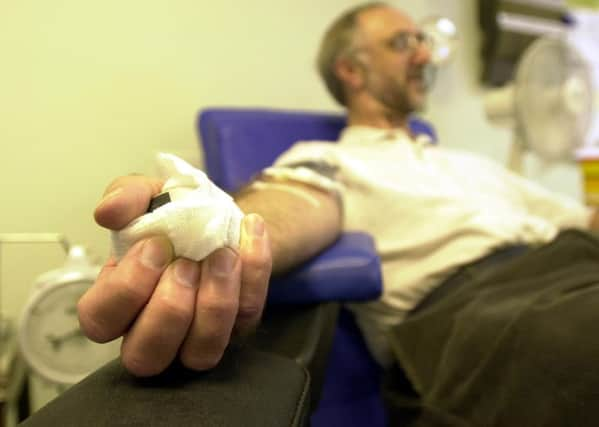Call for people in Lincolnshire to start donating blood to help fill shortages


The organisation is calling for more people to help fill the gaps by starting to donate.
To mark the start of National Blood Week (8-14 June 2015), which culminates with World Blood Donor Day on Sunday, NHS Blood and Transplant has explained that 204,000 new volunteers need to come forward this year across England and North Wales to keep the nation’s blood stocks at a safe level for the future.
Advertisement
Hide AdAdvertisement
Hide AdRegular donations are crucial to saving and improving the lives of patients with cancer, blood disorders and those suffering medical trauma or undergoing surgery 3,556 new volunteers came forward to donate blood for the first time in Lincolnshire last year, 5 per 1,000 of the estimated number of people between the ages of 17 and 70 living there. 31 per 1,000 people are active donors in Lincolnshire. 22,264 people living in Lincolnshire donated blood at least once last year, saving or improving up to three lives each time they did so.
During National Blood Week, NHS Blood and Transplant is working with partners including businesses, media and celebrities such as Jamie Oliver, Jorgie Porter and Claudia Winkleman to promote blood donation. They have been removing the letters A, O and B (the letters that make up the blood groups) from their names, raising awareness of the need for new blood donors with all blood types.
This ‘Missing Type’ campaign highlights that if not enough new people donate blood and these ‘types’ were to go missing in years to come, there wouldn’t be enough blood available when patients need it.
NHS Blood and Transplant needs new donors to fill the gaps left by existing donors who are not able to give blood at this time and to ensure that we have the right mix of blood groups to match patients’ needs.
Advertisement
Hide AdAdvertisement
Hide AdA number of misconceptions still exist about donating; almost half (48%) of the people responding to an NHS Blood and Transplant survey said they think that the NHS asks friends and family to donate when a patient needs blood and 13% think that synthetic blood is created to meet the national demand. However, 8 out of 10 people knew that unpaid volunteers are the way that blood stocks are maintained.
In 2015, 204,000 new volunteers need to attend a session to donate to ensure that the nation’s blood stocks continue to remain at a safe level in the future. When a survey asked for the reasons why they don’t give blood, respondents gave a range of reasons. The top three given were a fear of needles (22%), knowing it’s a good thing to do but not getting around to it (27%) and health problems so they don’t believe they are eligible to donate (21%), which may not be the case.
In contrast, 86% of respondents who had given blood felt that it was as expected, or easier than they expected it to be.
Jon Latham, Assistant Director for Donor Services and Marketing at NHS Blood and Transplant, said: “We simply can’t ignore the fact that there has been a stark reduction in the number of new donors coming forward - a trend seen across the world. While we can meet the needs of patients now, it’s important we strengthen the donor base for the future. If we don’t attract new people across England and North Wales to donate it will put more pressure on the ability to provide the right type of blood the NHS needs for patients in the future.
Advertisement
Hide AdAdvertisement
Hide Ad“We know that people’s lives have got busier over the last decade. People are working longer hours, commuting further, spending more time online and have less time of their own, despite more options of how to use it. Good causes are also competing increasingly for people’s attention and time.
“Travel to more exotic places, tattoos and investigations such as endoscopy are becoming more common and these lead to short term deferrals from donation. These are just some of the reasons why we’ve seen a decline in new people starting to donate. “Giving blood is an amazing thing to do. If you live in Lincolnshire and haven’t donated before, please help us reverse the decline in new donors. We run a number of sessions in the area. Please go to www.blood.co.uk, find out if you’re eligible to donate, register as a donor and book an appointment today. Giving blood is simple and easy to do and will only take about an hour of your time. It could literally be a matter of life and death for somebody else.”
There are a number of ways you can support National Blood Week and the Missing Type campaign:
·If you are 17 or over, visit www.blood.co.uk or call 0300 123 23 23 today to find out if you are eligible to donate, register as a blood donor and to book your appointment
Advertisement
Hide AdAdvertisement
Hide Ad·Download our app by searching ‘NHSGiveBlood’ in the App store. It’s available for Android, Windows and Apple Smartphone and tablet devices
·Show your support for blood donation on social media during National Blood Week by posting about blood donation and removing the As, Os and Bs, using #missingtype